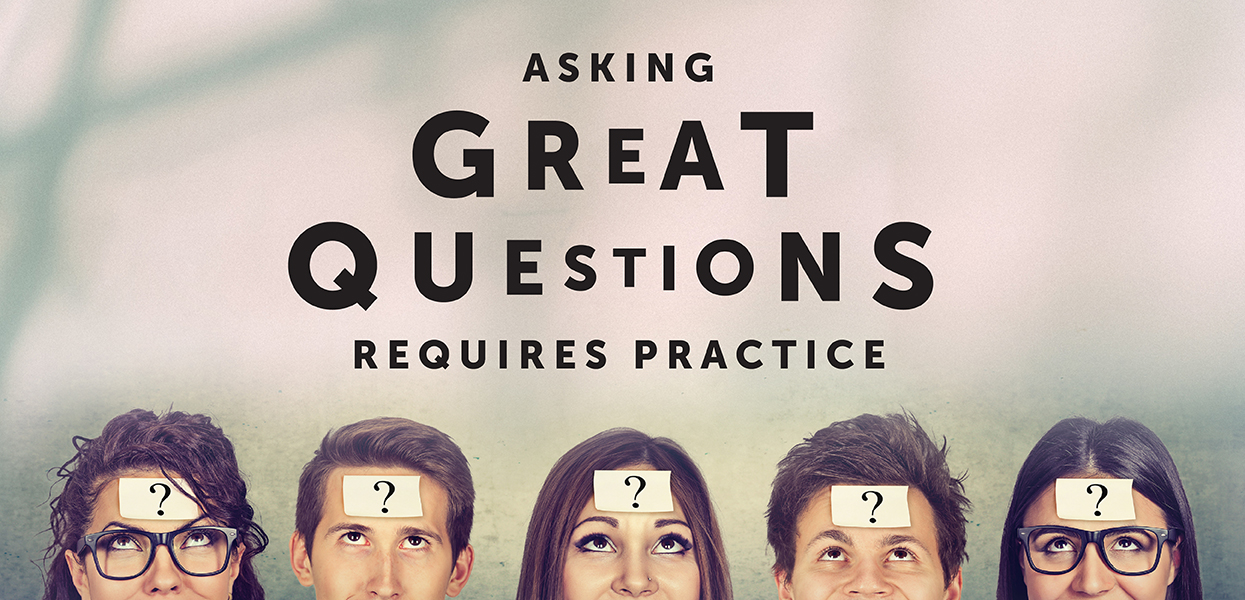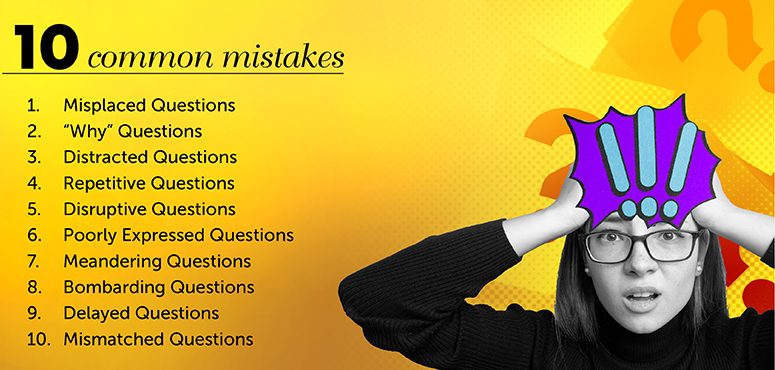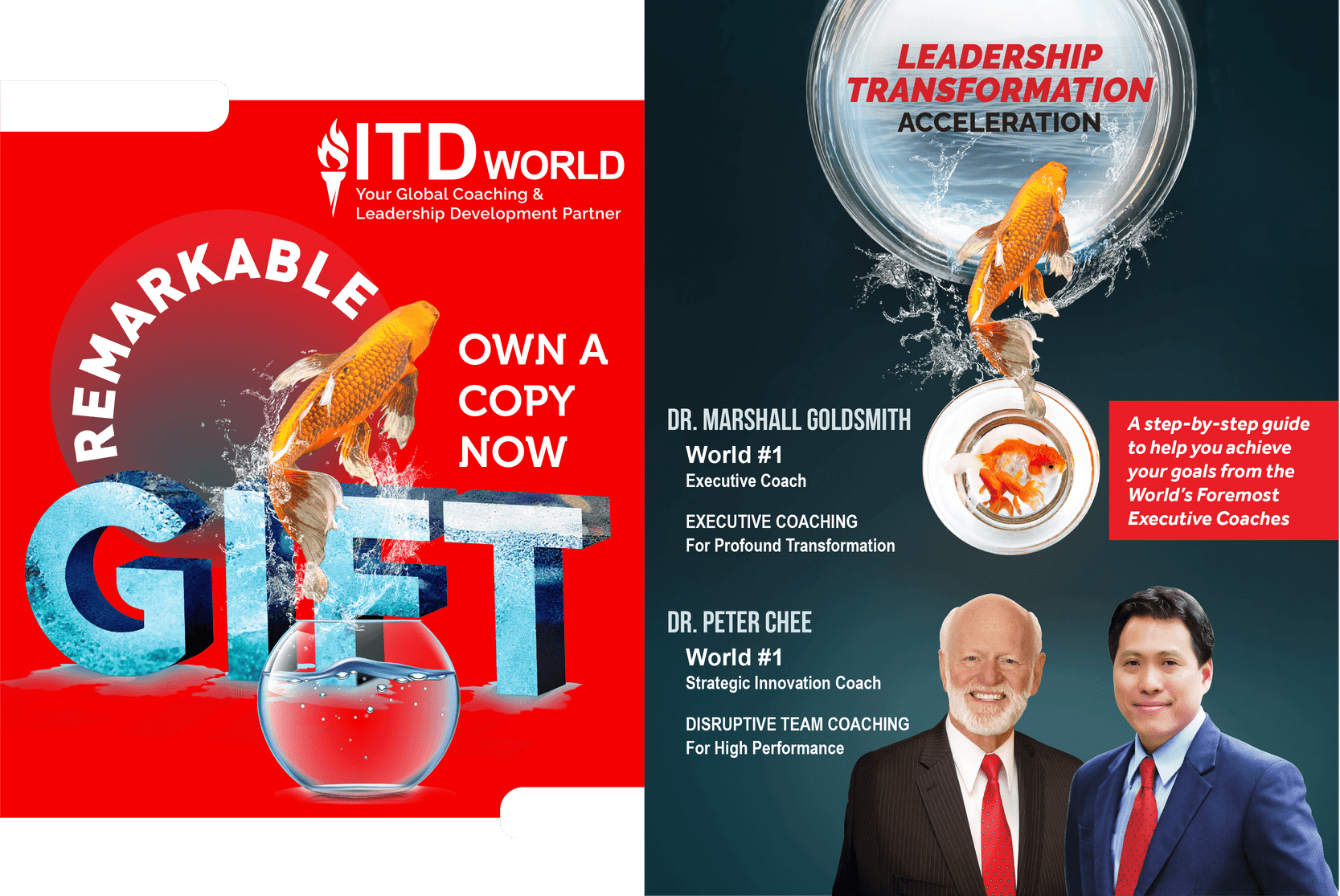


By Dr Peter Chee and Dr Jack Canfield
Some of the more common mistakes made when asking questions includes asking judgmental and advice-oriented questions, constantly asking closed-ended questions that tend to shut down a conversation and asking complex questions that cause people to get confused. These mistakes may have to do with the content and structure of the question.
Other mistakes may come in the form of the “how-to” of asking questions. Even the most experienced coaches may make mistakes in asking questions. This issue examines 10 common mistakes coaches make when asking questions, and what you can do to remain aware and overcome them. Here are some other common mistakes that coaches make:


Such incidents happen when the question does not fit with the situation or is asked when the timing is not right. These misplaced questions tend to disrupt the conversation, distract the coachee from the issue at hand, and affect the smooth flow. This can happen when the coach rushes to coachee to make a decision, even when the coachee is still trying to articulate their thoughts.
To overcome this mistake, you need to be constantly aware of where you and your coachee are in the coaching conversation. Keep these three question in mind to guide you to ask questions at the right time:

A coaching conversation, in which you ask too many “why” questions is like a tension-filled interview during a crime scene investigation when detective interrogates a suspect. For example, “Why did you lose your temper?” or “Why are you so emotionally stunted?” can make people feel threatened and go on the defensive.
Counter this mistake by rephrasing to, “Tell me more about what made you so angry?” or “What was the trigger for you temper, please elaborate?”. You can also change the “why” to a “what”, for example, “What can you do to be better aware of your emotions?”.

Coaches sometimes get distracted when they start thinking of the next question to ask. Move away from distractions by listening attentively instead of thinking of what question comes next. You can always think of the question when your coachee stops speaking. By listening attentively, you should be able to come up with the follow-up question to pose.

Avoid asking the same thing over and over again. No one likes to feel like they are being nagged, especially not from a coach who is expected to offer support. Instead of repeating questions, it’s better to ask people if they would like to elaborate further or if they have more things to share about the question.

Stay away from disrupting your coachee’s thinking by interrupting them while they are still speaking. When you interrupt them, they may lose their line of thinking and that spark of creativity can be extinguished. Make it a habit to let them finish speaking, wait for five to 10 seconds to see if they still have anything to say, before giving your response.

A coach’s voice is an important part of the coaching conversation. Speak too softly and no one hears you, shout and people may think you are angry at them, talk to fast and no one can understand, talk to slow and attention slips. Coaches should always be aware of how they use their voice which can have tremendous impact on their effectiveness.

Some clients may be baffled if your question seems to be beating around the bush or going around in circles. A straightforward approach is almost always best. Ask direct questions with clear thinking and a good flow. It helps to prepare before a coaching session; this will ensure that you enter the session with a clear mind.

The speed at which coaches ask questions can affect the discussion. Asking too many questions rapidly does not allow people the space they need to understand the question properly, or to think of the answer. Pause for at least ten seconds after asking a question before saying anything further.

Timing when asking questions is more art than science. Even so, consider interjecting if your coachee is speaking for a long time and is moving away from the topic. You can say, “You are doing great at expressing yourself. Would it be okay if I occasionally ask some questions to keep us on track?”.


He who asks is a fool for five minutes, but he who does not ask remains a fool forever.
– Chinese proverb

Think about who should ask different questions so that the right person asks the right questions. For example, “Should you be treated by a psychiatrist?” is a question that should be answered by a specialist not by the client. “What advice would you like me to give you?” might be suitable for people who you are mentoring or consulting rather than someone being coached. Take the trouble to check that you are asking the client a question that they can and should answer.
Maintaining the ability to ask great questions is like training our muscles: We need to work on them regularly to keep them in shape. When the flame of your curiosity burns brightly, and your question-asking muscles are kept well-toned, you can lift more weight off the shoulders of the people you coach and let them stand tall, rejoicing in the discovery of greater achievements.

Millions saw the apple fall, but Newton asked why.
– Bernard Baruch

TRANSFORMATIONAL COACHING QUESTIONS
EUREKA VIDEO
LATEST HAPPENINGS

ITD World is happy to announce our collaboration with our new strategic partners in coaching and leadership for organizational growth and development. A warm welcome to them and look forward to greater results ahead. Do click on their pictures to discover how they can help you and your team move to where you want to be.
LATEST HAPPENINGS AT ITD WORLD
Discover the answers at the 52nd ARTDO Conference from July 27-29, 2025, at the E&O Hotel in the historic city of George Town, Penang, Malaysia.
This year’s conference focuses on the theme of “High Performance Organizations with Talent Acceleration, Coaching Culture & Digital Leadership.”
A host of global thought leaders and industry experts are excited to share actionable insights, proven strategies, and innovative tools to empower teams and drive lasting success in a digital-first world.
Don’t miss this opportunity to transform your organization and lead with confidence into the future. Register before June 1 to enjoy an early bird discount of USD 1,000! Secure your spot today!
Our Certified Coaching and Mentoring Professional (CCMP) is ranked the world’s #2 Coaching Development Program by Global Gurus thanks to you!
The CCMP journey equips you with the essential coaching and mentoring capabilities to drive people for outstanding results.
Leverage on the caliber of the CCMP’s facilitating team which comprises a talented blend of experience and expertise who cumulatively has coached, mentored, and developed leaders round the world for more than 30 years.
Unleash the potential of people and empower them for results. Find out how!
FURTHER RESOURCES



